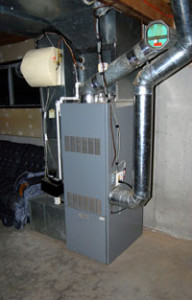 Installing a gas furnace is a reliably safe way to keep Fort Wayne's winter chill at bay. However, problems with your system can occur at any time. Knowing how to detect a gas leak can protect your family's health and safety.
Installing a gas furnace is a reliably safe way to keep Fort Wayne's winter chill at bay. However, problems with your system can occur at any time. Knowing how to detect a gas leak can protect your family's health and safety.
Low-level exposure to natural gas can cause headaches and difficulty breathing, but severe exposure can lead to unconsciousness and eventual death. What's more, gas is combustible and can cause an explosion. If you find a leak in your furnace, address the problem immediately by shutting off the gas and calling a technician.
Smell, Sound and Sight
Natural gas is odorless, but processors add a chemical called mercaptan, which smells like rotten eggs. If you notice this smell, you might have a furnace leak. However, no odor doesn't necessarily mean no leak. You may not notice the odor if you have a cold or a compromised sense of smell. In some cases, such as when new steel pipes are installed, the odor fades and becomes hard to detect.
In addition to an odor, you might hear a hissing sound as the gas escapes. Visually inspect your furnace gas lines for loose or damaged fittings, and check the length of the lines for pinholes.
Physical Detection Methods
Mix one tablespoon of dish soap into a cup of water. Then, pour the solution into a spray bottle and apply a heavy spray to the gas lines. If a leak is present anywhere you spray, bubbles will form in the soapy water solution.
A professional gas leak detector can also help. This device contains a sensor that can detect the presence of gas and sound an alarm. Keep in mind, though, that these detectors can miss small leaks and threaten your health. Knowing how to detect a gas leak isn't always enough. If you're experiencing the symptoms of natural gas exposure, but don't smell gas or detect a leak, the cause might be carbon monoxide.
Whether your furnace is leaking, or you just need a routine maintenance check, contact Hartman Brothers Heating & Air Conditioning Inc. in the Fort Wayne area.
Our goal is to help educate our customers in New Haven, Indiana and surrounding Fort Wayne area about energy and home comfort issues (specific to HVAC systems). For more information about gas leaks and other HVAC topics, download our free Home Comfort Resource guide.
Credit/Copyright Attribution: “ARENA Creative/Shutterstock”
